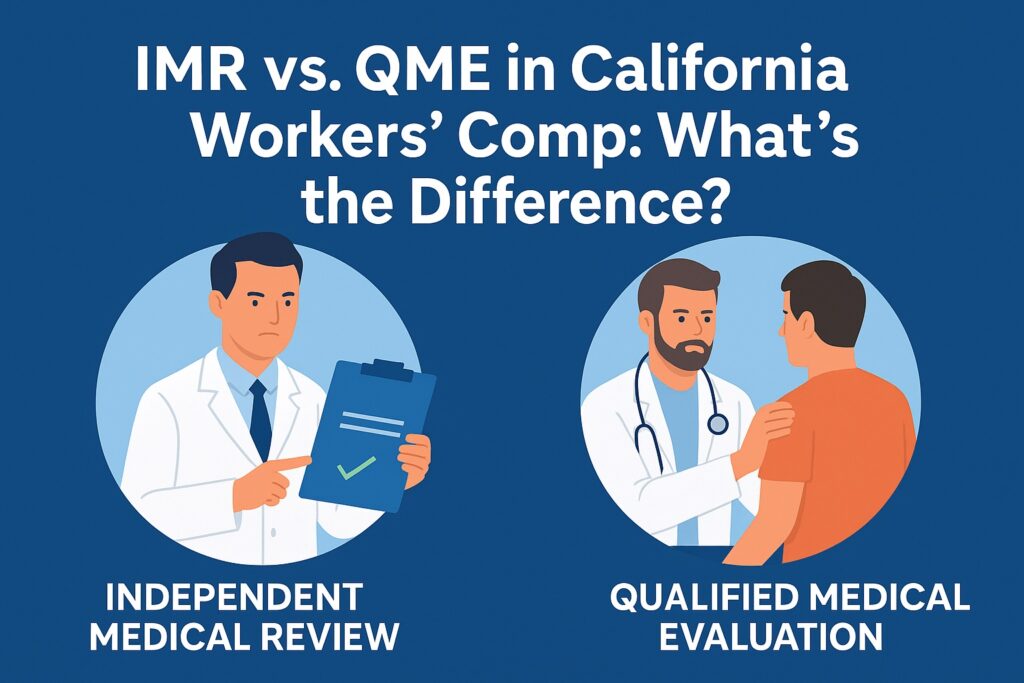
If your workers’ comp case hits a snag — like a treatment denial or a dispute over your level of disability — you’ll likely hear the terms IMR and QME. Both are part of California’s complex system for resolving disputes, but they serve very different purposes.
Understanding the difference between Independent Medical Review (IMR) and Qualified Medical Evaluators (QME) can help you make better decisions in your case — and avoid costly mistakes.
🔹 What Is an IMR?
Independent Medical Review (IMR) is the process used to challenge a Utilization Review (UR) denial. When your treating physician recommends medical treatment and the insurance company’s UR process denies it, you can appeal through IMR.
Key facts about IMR:
- Conducted by Maximus, a state-contracted third party
- The reviewing doctor is anonymous and independent
- Decision is based on medical guidelines, not personal examination
- Covers treatment disputes only (not disability or work status)
- The decision is final and binding
👉 Learn more: What Is Utilization Review?
🔹 What Is a QME?
A Qualified Medical Evaluator (QME) is a specially certified doctor who performs an in-person evaluation to resolve disputes about:
- Whether your injury is work-related
- Your level of permanent disability
- Your ability to return to work
- Apportionment (what portion of your injury is work-related)
QMEs are selected from a state-issued panel. In some cases, both parties may agree to use an Agreed Medical Evaluator (AME) instead.
👉 Explore: How to Choose the Right QME in Your Workers’ Comp Case
🔍 IMR vs. QME: Key Differences
| Feature | IMR | QME |
|---|---|---|
| Used For | Treatment disputes | Disability and injury disputes |
| Doctor Type | Anonymous reviewer | In-person medical evaluator |
| Who Assigns | State (Maximus) | Medical Unit panel |
| Binding Decision? | Yes | Usually, but can be challenged |
| Based On | Medical records and guidelines | Physical exam + records |
| Timeline | Fast (30 days avg.) | Slower (weeks to months) |
🛡️ Why These Differences Matter
Choosing the wrong process at the wrong time can delay your claim or even cause you to lose benefits. Many injured workers mistakenly believe:
- A QME can help overturn a treatment denial — they can’t
- An IMR can decide disability levels — it won’t
That’s why having legal guidance from the start is critical.
✅ How EFLL Helps With IMR and QME
At Employees First Labor Law, we guide clients through both IMR and QME disputes. We:
- Request IMR appeals immediately after treatment denials
- Select the best QME specialty for your injury
- Prepare you for QME exams to ensure accurate reporting
- Challenge flawed QME reports when necessary
- Coordinate both medical and legal strategies to maximize your claim
🔹 Why Choose Employees First Labor Law?
Most firms handle workers’ comp OR civil litigation. We do both. That means:
✅ Your treatment and disability disputes are handled aggressively
✅ Your medical evidence is coordinated across your entire case
✅ If a third party is responsible, we pursue additional compensation outside of comp
✅ You get long-term guidance — not just quick fixes
📞 Contact us today for a free consultation.
Whether you’re facing a denial or a difficult QME, we’ll make sure your rights are protected and your recovery is maximized.
📩 Schedule a consultation
📞 Call us now to speak with a workers’ comp attorney



